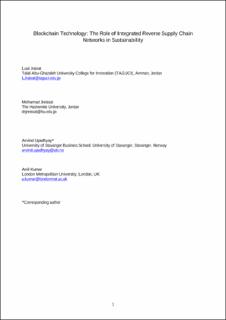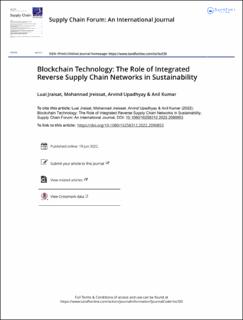| dc.contributor.author | Jraisat, Luai | |
| dc.contributor.author | Jresseit, Mohannad | |
| dc.contributor.author | Upadhyay, Arvind | |
| dc.contributor.author | Kumar, Anil | |
| dc.date.accessioned | 2022-07-12T13:13:23Z | |
| dc.date.available | 2022-07-12T13:13:23Z | |
| dc.date.created | 2022-06-14T20:00:56Z | |
| dc.date.issued | 2022-06 | |
| dc.identifier.citation | Jraisat, L., Jresseit, M., Upadhyay, A., Kumar, A. (2022) Blockchain Technology: The Role of Integrated Reverse Supply Chain Networks in Sustainability. Supply Chain Forum: an International Journal | en_US |
| dc.identifier.issn | 1625-8312 | |
| dc.identifier.uri | https://hdl.handle.net/11250/3004689 | |
| dc.description.abstract | This research explores the role of Blockchain Technology (BCT) integrated with Reverse Supply Chain Networks (RSCN) and evaluates the relationship between BCT and sustainability performance in multi-industries. A qualitative research design was employed to develop a conceptual framework for BCT in RSCN for multi-industries. This research collected and analysed primary and secondary data from four case studies as focal actors. These focal actors are from industries in Jordan, namely food, pharmaceuticals, electronics, and toys. These actors are lead firms in their RSCNs and have experience working with RSCNs and technology applications such as BCT. Primary data were acquired from interviews with managers working in various industries. Analysis of secondary data has identified two types of the key BCT-influencing themes: internally focused and externally focused BCT-integrated drivers of RSCNs. The analysis also identified how they leverage sustainability performance improvements, including their use of RSCN approaches and features. This research is one of the few attempts to explore BCT integrated into RSCN for better sustainability performance through understanding the implementation and evaluation that contributes to the theoretical and practical knowledge of supply chains within emerging economies. All types of actors-as-stakeholders involved with national programs and projects can adopt the new framework that provides the changes required for RSCN. The key findings contribute to the field of RSCN where the adoption of BCT as a broad-based strategy to attain sustainability goals and reverse chain activities along the supply chain is a goal. | en_US |
| dc.language.iso | eng | en_US |
| dc.publisher | Taylor & Francis Group, LLC | en_US |
| dc.relation.uri | https://www.tandfonline.com/doi/full/10.1080/16258312.2022.2090853 | |
| dc.rights | Attribution-NonCommercial-NoDerivatives 4.0 Internasjonal | * |
| dc.rights.uri | http://creativecommons.org/licenses/by-nc-nd/4.0/deed.no | * |
| dc.subject | økonomi | en_US |
| dc.subject | blockchain | en_US |
| dc.subject | supply chain | en_US |
| dc.title | Blockchain Technology: The Role of Integrated Reverse Supply Chain Networks in Sustainability | en_US |
| dc.type | Peer reviewed | en_US |
| dc.type | Journal article | en_US |
| dc.description.version | acceptedVersion | en_US |
| dc.description.version | publishedVersion | en_US |
| dc.subject.nsi | VDP::Samfunnsvitenskap: 200::Økonomi: 210::Bedriftsøkonomi: 213 | en_US |
| dc.source.pagenumber | 1-15 | en_US |
| dc.source.journal | Supply Chain Forum: an International Journal | en_US |
| dc.identifier.doi | 10.1080/16258312.2022.2090853 | |
| dc.identifier.cristin | 2031878 | |
| cristin.ispublished | true | |
| cristin.fulltext | postprint | |
| cristin.fulltext | original | |
| cristin.qualitycode | 1 | |


